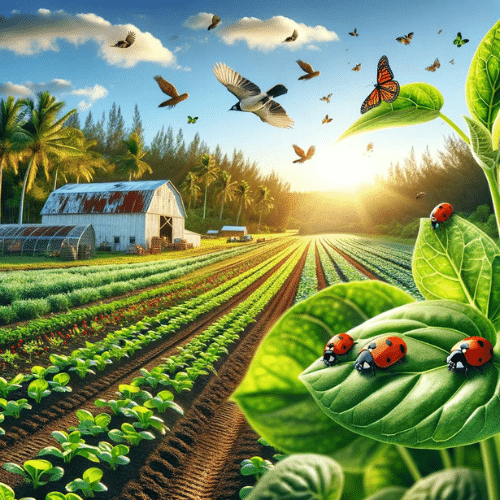
28 Feb IPM for Sustainable Agriculture
Nature’s Approach to Pest Management
Farming is more than just a job; it’s a way of life. In South Florida, our unique climate presents both opportunities and challenges, especially when it comes to pest management. Traditional methods often rely heavily on chemical pesticides, but there’s a growing movement towards a greener approach. Sustainable pest management is not just good for the environment; it’s also great for your crops and your conscience.
So, what exactly is sustainable pest management? In simple terms, it’s all about controlling pests in a way that’s safe for the environment, the people, and the plants. It’s a holistic approach that considers the long-term health of the ecosystem.
By using techniques that minimize harm to beneficial organisms and reduce the risk of pests developing resistance, sustainable pest management helps ensure that your farm remains productive for years to come.
One of the key benefits of this approach is that it can actually save you money in the long run. By reducing reliance on expensive chemical pesticides and promoting natural pest control methods, you can lower your costs while still keeping those pesky pests at bay. Plus, with consumers becoming more environmentally conscious, adopting sustainable practices can give your farm a competitive edge in the market.
Managing Common Crop Pests Effectively
In our region, we’re no strangers to pests. From the tiny aphids that suck the life out of our plants to the whiteflies that spread disease, these critters can cause a lot of headaches for farmers.
Nematodes, too, are a common problem, attacking the roots of crops and reducing yields. Understanding the pests you’re dealing with is the first step in managing them effectively.
Each pest has its own habits and weaknesses, and by getting to know them, you can tailor your pest management strategies to be more effective.
For example, certain pests might be more active at particular times of the year, so timing your interventions can make a big difference. Regular monitoring of your crops is also crucial to catch any infestations early before they can do too much damage.
Balancing Biodiversity in Pest Control
When it comes to sustainable pest management, there are several strategies you can use. Biological control is one of the most natural methods, where you introduce or encourage beneficial organisms like predators or parasites to control pest populations.
For instance, ladybugs are great at munching on aphids, while certain wasps can help keep caterpillar numbers in check.
Cultural practices are another key component of sustainable pest management. Things like crop rotation, intercropping, and maintaining healthy soil can all help reduce the likelihood of pest outbreaks. By creating a more diverse and resilient farming system, you can make it harder for pests to take hold.
Physical and mechanical controls, such as barriers, traps, and manual removal, can also be effective in keeping pests at bay without resorting to chemicals. And when it comes to chemical controls, opting for organic or low-toxicity pesticides can provide a safer alternative to more harmful products.
Adopting IPM for Sustainable Farming
For a truly comprehensive approach to pest management, consider adopting an Integrated Pest Management (IPM) plan. IPM combines multiple strategies to manage pests in an effective and environmentally friendly way. It’s about using the right tools at the right time and in the right way to keep pest populations under control.
Implementing an IPM plan starts with proper identification of pests and understanding their life cycles. From there, you can set action thresholds to determine when it’s necessary to intervene. Monitoring and regular assessment of pest activity are crucial to ensure that your management efforts are effective and timely.
Adopting IPM also involves continuous learning and adaptation. As pest patterns change, so should your strategies. Collaborating with local experts and fellow farmers can provide valuable insights and support in maintaining a successful IPM plan.
Farmer Wins
Many South Florida farmers have already seen success with sustainable pest management. For example, a local tomato farmer reduced his reliance on chemical pesticides by introducing beneficial insects to his fields. Not only did this help control pests naturally, but it also led to healthier plants and a better yield.
Another success story comes from a citrus grower who implemented crop rotation and cover cropping to manage nematodes. By diversifying his crops and improving soil health, he was able to reduce nematode populations and boost his harvest.
If you’re interested in adopting sustainable pest management practices, there are plenty of resources and support available. Local agricultural extension services can provide valuable information and guidance tailored to our region’s specific challenges.
Organizations like the Florida Department of Agriculture and Consumer Services offer programs and workshops to help farmers learn more about sustainable farming techniques.
Conclusion
In conclusion, the adoption of sustainable pest management practices has been proven to be beneficial by many farmers in South Florida. Not only is it environmentally friendly, but it also enhances crop health and yield. The success stories of local farmers serve as a testament to the effectiveness of these green approaches.
By embracing methods such as biological control, cultural practices, and Integrated Pest Management (IPM), farmers can ensure the long-term productivity and sustainability of their farms. It is clear that a shift towards more natural pest management strategies is not just a trend, but a necessary evolution in agriculture.
As we move forward, continued support and resources from local agricultural services and organizations will be crucial in promoting and maintaining sustainable farming practices. The future of farming in South Florida looks promising, with an increasing number of farmers adopting eco-friendly pest management solutions for a healthier and more sustainable agriculture industry.


No Comments